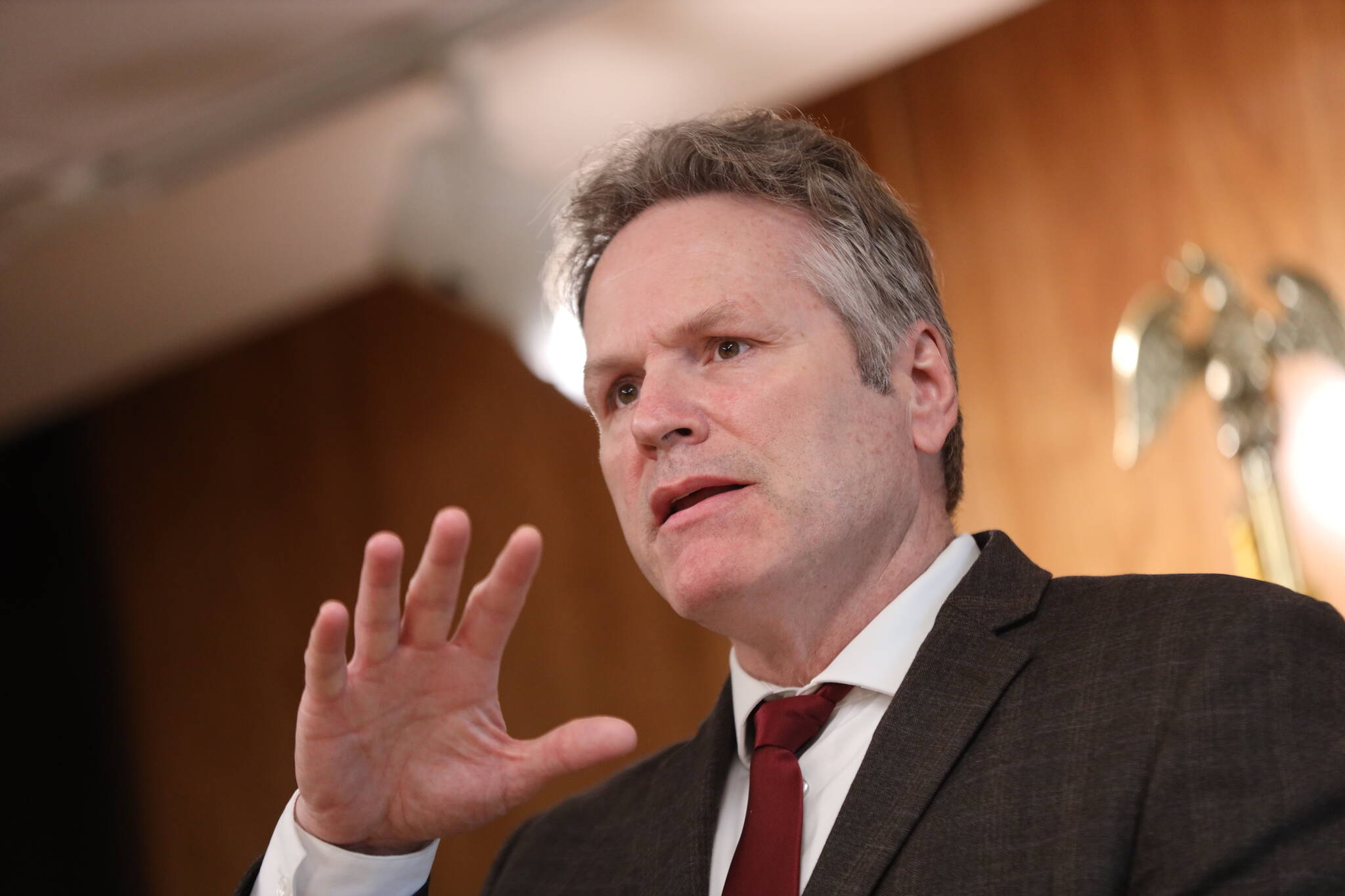Gov. Mike Dunleavy, during a news conference in a room packed with state legislators on Thursday, said it’s likely he will introduce a bill for a statewide sales tax — citing 1% as a possible amount — within days and a special session focusing on a long-term fiscal plan is possible in the coming months.
Dunleavy and legislative leaders offered few specifics during the 47-minute gathering, instead emphasizing they agree that a long-range plan is a priority and it will need a multitude of parts. Such pledges to seek a sustainable solution have been expressed by state lawmakers many times over the years, but Dunleavy said he believes the state’s long-term decline in oil revenue and other factors have reached a point where policymakers are ready to make concessions to resolve the situation.
“We wouldn’t be wasting your time with a press conference if we didn’t think there’s a good chance of this happening,” he said.
The news conference was staged with fewer than 20 days left in the legislative session, with Dunleavy and the Senate still nearly $1 billion apart on a budget for the fiscal year starting July 1 — the House’s version occupies a middle ground — that needs to be passed before they adjourn — unless a special session is subsequently called.
The biggest disagreement is the size of the Permanent Fund dividend, with Dunleavy’s budget containing a roughly $3,500 PFD and a deficit of more than $900 million, the House a $2,700 PFD and $600 million deficit and the Senate a $1,300 PFD and a surplus of $90 million.
Dunleavy, when asked what movement he and the Senate in particular have made recently toward resolving that gap, said he’s confident differences will get worked out as they have in past years and their goal at this point is to look beyond the short term.
“We’ll get a budget done, but what we want to do is get beyond the one or two components we fight on every year,” he said.
House Speaker Cathy Tilton, a Wasilla Republican, said a focus by lawmakers and the public on a single item such as PFDs doesn’t work if the goal is a longer-range strategy.
“The real picture here is everything we do in a fiscal plan needs to run together and it needs to be something the entire Legislature agrees upon along with the executive,” she said.
That doesn’t mean all lawmakers agreeing on individual aspects of the plan, according to those speaking during the news conference.
“I think what you’re seeing is people are saying we need to compromise, nobody will get everything they want,” said Sen. Bill Wielechowski, an Anchorage Democrat who’s introduced a bill increasing taxes on oil companies that’s already had some of its provisions stripped down.
Dunleavy’s sales tax bill, which he said should be drafted by Friday, along with other comments he made during the news conference such as not flat-out rejecting an income tax are shifts from statements he and his spokespeople have made as recently as a week ago. He’s met numerous times with legislators in recent weeks, including a session with House and Senate members last Thursday when his sales tax proposal was brought up.
An interactive spreadsheet showing a variety adjustable revenue and expenditure categories — including oil prices, inflation, various types of taxes, education spending and PFDs — was displayed during the press conference. Neil Steininger, the governor’s budget director, showed how the fiscal picture looks during the next decade under several scenarios — although it took the minimal PFDs sought by the Senate along with some new low-level tax to clearly put the state in the green throughout those years even at less-than-optimal oil prices.
While lawmakers talked about the willingness for a special session focusing on a long-range plan if one isn’t developed during the session, the timing is uncertain. Among the possibilities mentioned by lawmakers recently are immediately after the regular session if the various sides appear near to an agreement, or during the fall when policymakers have a better sense of how oil prices are likely to fare during the coming fiscal year.
“Don’t be surprised if there’s some quick movement to put together a fiscal plan,” Dunleavy said, adding “it may not happen in this (session’s) time frame.”

